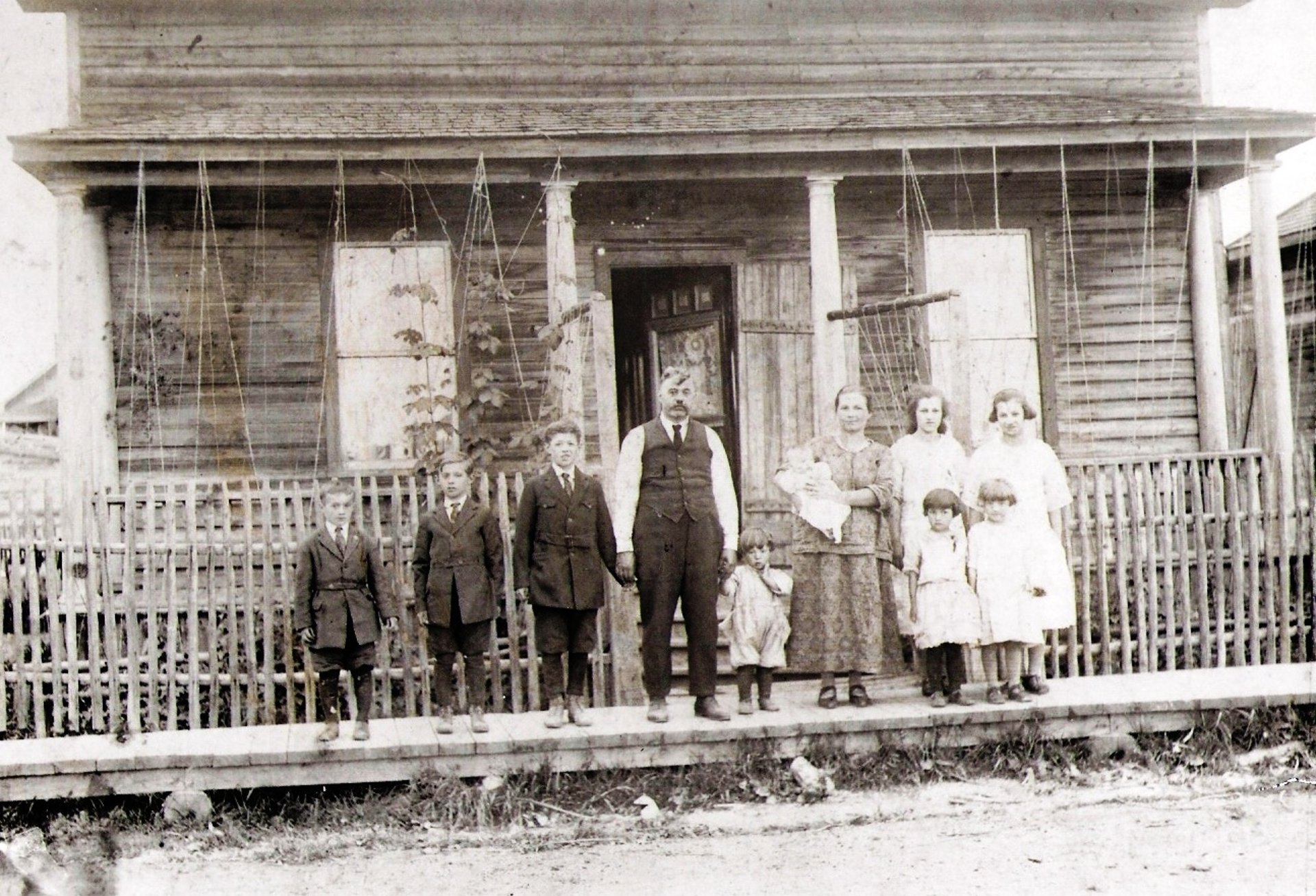
Baby Family in Coniston, 1924. Credit: Charlie Rapsky
Ukrainians began to arrive in the Sudbury region shortly after the turn of the twentieth century. Although a number of women were among these early settlers, the bulk of those who came to the area were migrant male labourers. In search of a decent and reliable wage, these Ukrainians tended to settle in the outlying multi-ethnic company towns that surrounded Sudbury, living close to the nickel mines where they formed heavily masculine and highly transient communities that helped them endure the difficult and dangerous conditions of mining. Old World ideological beliefs and the harsh working conditions that Ukrainian men faced on a daily basis complicated belonging and community building, as did the enemy alien label that the Canadian government applied to them during World War I.
This Ukrainian community experienced significant demographic growth during the 1920s. As more Ukrainians came to the region, they began to move out of the outlying districts and into Sudbury, Coniston, and Levack where they formed family-focused communities within the neighbourhoods being built within these towns. Although more women began to settle in these places, taking on gendered roles within their households, these communities remained largely masculine and therefore quite transient in nature. Subject to the whims of the local mining companies, migrant male labourers tended to move from town to town, searching for employment opportunities and ultimately stability.
Baba’s father came to Sudbury in the mid-1920s, settling in the Donovan, which was a multi-ethnic neighbourhood just northwest of the downtown core and within walking distance of the International Nickel Company’s Frood Mine. Like other Ukrainians, he sought stability for both him and his family through steady employment in the region’s mining sector. This web of stories uses the experiences of Baba’s family to begin to understand those remembered by other Ukrainian men and women. It explores the circumstances that led Ukrainians to Sudbury and outlines the challenges that they faced when recreating their homes and communities.
These audio clips coincide with the stories told in Chapter One in According to Baba: A Collaborative History of Sudbury's Ukrainian Community.
Baba speaks about the employment circumstances that led her father to Sudbury.
Lorraine Jurgilas (nee Burke) explains why her father changed his name shortly after arriving in Sudbury.
Victoria Bilczuk (nee Bodnarchuk) describes how communal associations led her family to settle in Sudbury.
Ramona Bendick (nee Shyluk) discusses the circumstances that brought her family to Sudbury.
Michael Babuik shares his memories of coming to Sudbury and getting a job at the International Nickel Company.
Walter Shelegey describes his mother’s first impressions of Coniston and her decision to stay in Canada.
Mary Zawierzeniec (nee Nykilchyk) shares her memories of coming to Sudbury. Clip Length
Nick and Elsie Solski (nee Kotyluk) discuss the ethno-linguistic divisions within Coniston.
William Babij describes how his parents both came to Coniston and shortly thereafter met each other and got married.
Patricia Chytuk (nee Urchyshyn) speaks about coming to Sudbury from Western Canada.
John Stefura recalls how family friends encouraged his parents to settle in Sudbury.
Oryst Sawchuk speaks about the circumstances that brought his mother, his brother, and him to Sudbury.
Tom Zaitz describes why his father came to Sudbury and what it was like to work at the Mond Nickel Mine and in the forestry industry.
Mary Cloutier (nee Werstiuk) speaks about the importance of chain migration for her family.
Walter Shelegey shares his memories of Pollack Town in Coniston.
Pauline Kruk (nee Mykoluk) describes why her father chose to leave his job at the International Nickel Company.
Nellie Kozak (nee Tataryn) speaks about a cave-in at Frood Mine in 1931 that nearly killed her father.